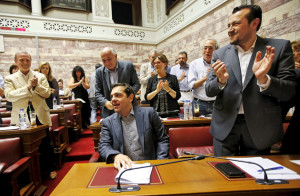ATHENS — Optimism rose on Friday over the prospects of an accord between Greece and its international creditors, as the two sides weighed the latest measures from Athens aimed at overhauling its economy and securing its place in the euro currency bloc.
Prime Minister Alexis Tsipras’s government on Thursday agreed to meet most of the terms demanded by the creditors with a mix of tax increases and spending cuts, and it requested a three-year, 53.5 billion euro, or $59 billion, bailout as a starting point for talks about possible debt relief.
How lawmakers in Greece and the country’s creditors — the European Central Bank, the International Monetary Fund and the other eurozone countries, including a skeptical Germany — will receive the government’s latest proposal will determine whether the nation will be able to halt its economic tailspin and avoid a potentially chaotic exit from the eurozone.
Investors seemed increasingly optimistic in Friday trading. The Euro Stoxx 50 index of eurozone blue chips rose 2.6 percent at midday, picking up where it left off on Thursday after signs of a thaw in the Greek negotiations began to emerge. The FTSE 100 in London gained 1.1 percent, and trading in Standard & Poor’s 500 index futures indicated that New York was heading for a rally at the opening. The markets were also buoyed by a continued rebound in Shanghai shares after Beijing introduced measures to support cratering Chinese stocks.
While the Athens stock market remains closed, Greek bond yields plummeted, a sign of confidence that lenders will be repaid. Two-year Greek government debt soared in price, while the yield, which moves in the opposite direction, plunged 15 percentage points to 36.5 percent.
The Greek government’s latest batch of policy overhauls received a positive welcome from President François Hollande of France, though some officials in Germany, the biggest eurozone creditor, expressed doubts.
“The Greek program is serious, credible and shows a determination to remain in the eurozone,” Mr. Hollande said. “Nothing is done, yet everything can be done.”
A European Union official, who spoke on the condition of anonymity because the plans were evolving, suggested that an agreement could, in theory, be reached on Saturday at a meeting of eurozone finance ministers. If so, the official said, a summit meeting of the 19 leaders of eurozone nations planned for Sunday would probably be called off.
In its proposal, the Greek government is basically conceding to things that it had said it did not want, and which the nation voted no to in the referendum on Sunday.
The offer included a proposal to raise certain value-added taxes and eliminate parts of a politically charged tax break that has long applied to the Greek islands, in a bid to pull in billions of euros in tax revenue. In addition, Athens proposed raising the corporate tax rate, broadening the tax base to include lower-income earners and eventually raising the retirement age to 67.

The proposal also contained pledges that Greece has made in years past, but which have made little progress, including a vow to speed up the privatization of state assets to raise cash and to crack down on corruption and an inefficient judicial system.
Critically, though, Athens proposed targeting a low so-called primary surplus of 1 percent this year with gradual increases in subsequent moves; the term refers to the amount of cash in its treasury after expenses and interest payments. Athens has argued that being allowed to keep more money on hand rather than spending it on debt payments will allow for some spending stimulus that is needed to stoke the moribund economy.
Hans-Peter Friedrich, a member of the Christian Social Union in Bavaria, which is part of Chancellor Angela Merkel’s conservative bloc, expressed skepticism about the program, noting that many of its points were part of the deal rejected by Greeks in the referendum last weekend.
“That means there are two possibilities: either the Greek government is tricking its own people, or us yet again,” Mr. Friedrich told Deutschlandfunk radio early Friday, noting that he had not yet seen the full proposal.


